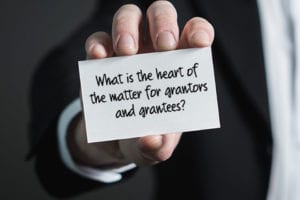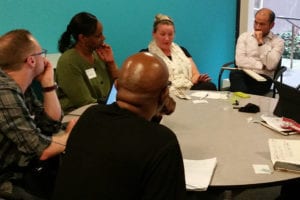Creating best practices to help grantors and grantees to work collaboratively on data and evaluation
Over the course of a year and half, Tech Networks of Boston held a held a unique dialogue program to facilitate grant maker/grant recipient dialogue on nonprofit data and evaluation. TSNE MissionWorks provided the event space and refreshments, and Essential Partners provided facilitation and guidance for the structure of the session. We were thrilled to have these mission-driven organizations act as co-hosts.
The series included an equal number of grant makers and nonprofit grant recipients for each session that met as peers for reflective structured dialogue. Dave Joseph of Essential Partners served as facilitator-in-chief.
Our purpose is to document the way in which the series was structured, and to communicate the best practices that emerged at the conclusion of the series.

First Grant Maker/Grant Recipient Dialogue on Nonprofit Data and Evaluation
The first program was held on June 20th, 2017 and included small group conversations in a safe-enough atmosphere designed to clarify perspectives and surface areas of agreement and difference.
Grant makers and grant recipients engaged in fresh, new, deeper conversation about these complex and challenging issues.
This session acted as a kick-off for brainstorming the issues that would shape the second session in the series.

Second Grant Maker/Grant Recipient Dialogue on Nonprofit Data & Evaluation
The second grant maker/grant recipient dialogue was held on September 25, 2017 and was a follow-up to the kick-off dialogue on June 20th.
Participant feedback was strongly positive, expressing hopes that the Reflective Structured Dialogue process will continue, and that even deeper conversation will emerge from the second and third sessions.
This dialogue offered the opportunity to have an intimate conversation that explored issues such as power imbalances and the role of assumptions in greater depth.

Third Grant Maker/Grant Recipient Dialogue on Nonprofit Data and Evaluation
The third and final dialogue was held on January 11, 2018.
This dialogue focused on developing a set of best practices for data and evaluation that were offered to nonprofits and grant makers, in order to assist and guide them toward meaningful collaboration. The attendees contributed to a set of working principles and how to address this as grantors and grantees.
This afternoon event included parallel working sessions for grant makers and nonprofit professional to distill their ideas, followed by full-group sharing and discussion.

Funders can help by:
-
- Understanding that nonprofits perceive that funders have more money, which means more power.
-
- Asking nonprofits to define their goals, their desired outcomes, and their quantitative measures of success – rather than telling them what these should be.
-
- Factoring in the nonprofit organization’s size, capacity, and budget – making sure that the demand for data and evaluation is commensurate.
-
- Understanding the real cost in dollars to grantees who provide the data reporting and evaluation that you request. These dollar amounts might be for staff time, technology, training, an external consultant, or even for office supplies.
-
- Providing financial support for any data or evaluation that the funder needs – especially if the nonprofit does not have an internal need for that data or evaluation. Items to support might include staff time, technology, training, or retaining an external consultant with the necessary skill set.
-
- Putting an emphasis on listening.
Nonprofits can help by:
-
- Engaging in a quantitative analysis of their operations and capacity, and sharing this information with funders.
-
- Understanding that grant makers are motivated to see nonprofit grant recipients succeed.
-
- Understanding that grant makers are often under pressure from donors and their boards to deliver a portfolio of outcomes.
-
- Integrating the use of data and evaluation into most areas of operation – this means building skills in data and evaluation across the entire organization.
-
- Gathering with other nonprofits that have similar desired outcomes and comparing notes on failures and best practices.
-
- Fostering a data-friendly, continuous learning culture within nonprofit organizations.
Both groups can help by:
-
- Engaging in self-scrutiny about how factors such as race and class affect how data is collected, categorized, analyzed, and reported.
-
- Talking frankly about how power dynamics affect their relationships.
-
- Engaging in ongoing dialogue that is facilitated by a third party who is experienced in creating a safe space.
-
- Talking about and planning the evaluation process well before the grant begins.
-
- Creating clear definitions of key terms pertaining to data and evaluation.
-
- Making “I don’t know” an acceptable response to a question.
-
- Measuring what you really value, rather than simply valuing what you can easily measure.
-
- Working toward useful standards of measurement. Not all programs and outcomes are identical, but very few are entirely sui generis.
-
- Sharing responsibility for building the relationship.
-
- Speaking with each other on a regular basis.
-
- Studying (and implementing) community-based participatory research methods.

-
- Funders can help by making an effort to recognize a nonprofit’s internal capacity for conducting evaluation processes. This includes having awareness of the costs nonprofits sustain as grantees.
-
- Nonprofits should realize that the requests of evaluation and accountability stem from a similar place for the funders, which is wanting to speak to stakeholders and report that their dollars are being well spent.
-
- Both groups would be well served by being able to ask questions, think about what it is that might be underlying the positions the other is taking, and inquire about the constraints and incentives of the process.
 Ellen Bass, a grant recipient of the Capacity Institute shared her key takeaways:
Ellen Bass, a grant recipient of the Capacity Institute shared her key takeaways:
-
- Relationship is (almost) everything; clear communication is central to that. The process fostered clear communication; good evaluation fosters clear communication.
-
- Importance of story AND data (always…great that this surfaced in a meeting about data)
-
- Importance of capacity building …..and ongoing learning for improved results
-
- The sector may need a shift in structure related to evaluation. We need not only agreement on terminology, but also generally-accepted social impact principles and standards of measurement and reporting (like the accounting field has developed over the last 80 years in GAAP).

“I was reminded that capacity building around evaluation is not always about tools, models, and frameworks, it’s also about the development of the people leading the evaluation work. This is even more true in relation to equity work – if one doesn’t have a deep enough grasp of racial equity, it’s hard to develop an effective evaluation process.”

-
- Importance of transparency and openness for greater alignment on shared purpose of evaluation and reporting
-
- To increase usefulness and decrease burden on grantees, value learning and improvement over accountability when designing reporting systems
-
- Be mindful of only requesting and collecting data from grantees that will actively be used by the funder, and communicating clearly to grantees about how the funder will use the data reported
Yvonne has also shared some recommended resources for funders:
-
- Fund for Shared Insight has a series of blog posts on Foundation Openness
-
- The Foundation Center Glasspockets on Why Transparency?
-
- The Center for Effective Philanthropy report Benchmarking Foundation Evaluation Practice

-
- Nonprofits have more leverage in the power dynamic that they realize. Start from that place when engaging with grantors about producing outcomes that are meaningful for both grantee and grantor. Seek those leverage points as we cultivate your relationships.
-
- Be honest when something appears not to be working as planned. Many funders expressed that they want to know that, and are willing to re-negotiate the outcome goals with you, as soon as possible.
-
- Many grantors expressed a desire to negotiate or collaboratively agree on the data and evaluation requirements of the funder in context of the grantee’s organizational capacity.
-
- Participants seemed interested in continuing these structured conversations in an effort to improve the sector, recognizing that what is currently referred to as the “Charitable Sector” consists of several categories of players. It would be great if other intermediaries could sponsor and organize an annual series (2-3 sessions). This series took several years to plan, but now that it has launched, the momentum should be sustained. This series has proved that a safe place for structured conversation can be established, and that it can be done economically.
Brainstorming best practices
The raw notes that were compiled in the third and final session can be viewed here.
These notes were key in brainstorming specific best practices for grant makers and nonprofit grant recipients who want to work collaboratively and productively on data and evaluation.

 Ellen Bass, a grant recipient of the Capacity Institute shared her key takeaways:
Ellen Bass, a grant recipient of the Capacity Institute shared her key takeaways: